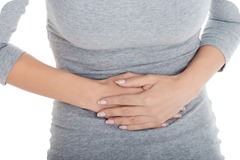Introduction:
The relationship between the microbiota in the gut and the etiology (cause) of irritable bowel syndrome (IBS) is becoming increasingly clear. IBS is one of the  most common gastrointestinal conditions, and more common in women. It is characterized by abdominal discomfort or pain and variable types of other symptoms including episodic diarrhea and/or constipation, bloating, and even non-gut symptoms such as backache, muscle pains, joint pains, anxiety and mood issues and fatigue. The use of probiotics has received much interest in that different probiotics species and strains can effect intestinal motility, visceral hypersensitivity, secretion of immune chemicals and increase anti-inflammatory populations. While clinical trials with probiotics for IBS still yields conflicting results, improved research designs and research quality are warranted. That said, two large meta-analyses of 2008 and 2009 concluded that probiotics may be of benefit in the treatment of IBS. For practitioners of alternative and integrative medicine in particular, probiotics are becoming one of the mainstays of treatment for IBS. The current study is supportive of that practice.
most common gastrointestinal conditions, and more common in women. It is characterized by abdominal discomfort or pain and variable types of other symptoms including episodic diarrhea and/or constipation, bloating, and even non-gut symptoms such as backache, muscle pains, joint pains, anxiety and mood issues and fatigue. The use of probiotics has received much interest in that different probiotics species and strains can effect intestinal motility, visceral hypersensitivity, secretion of immune chemicals and increase anti-inflammatory populations. While clinical trials with probiotics for IBS still yields conflicting results, improved research designs and research quality are warranted. That said, two large meta-analyses of 2008 and 2009 concluded that probiotics may be of benefit in the treatment of IBS. For practitioners of alternative and integrative medicine in particular, probiotics are becoming one of the mainstays of treatment for IBS. The current study is supportive of that practice.
Study:
This recent randomized, double-blind, placebo-controlled trial of adult women and men with symptomatic IBS was undertaken for 12 weeks. A total of 152 patients completed the 12 week study with 100 in the probiotic group and 52 in the placebo group. The four species/strains of probiotic were Lactobacillus rhamnosus NCIMB 30174, L. plantarum NCIMB 30173, L. acidophilus NCIMB 30175 and Enterococcus faecium NCIMB 30176. The bacteria were in a water based suspension of barley extract with each 50mL dose containing 10 billion live organisms.
Results:
The primary outcome showed a highly significant result in favor of the probiotic. Improvements in individual symptoms of pain and bowel habits were noted, rather than in bloating or quality of life issues. The pain symptoms improved in severity from moderate/severe to mild/no symptoms, although the difference was not considered statistically significant. Four weeks after completing the 12 week treatment, the difference in the IBS symptom severity scores between the probiotic and placebo groups were no longer apparent.
Commentary: In the current study, 94% of the patients enrolled had at least moderate to severe symptoms of IBS… indicating that probiotics can help even these folks. The significant improvement in pain scores in the probiotics group is especially relevant given that pain is most often the single most important bothersome symptoms of IBS.
Multi-species/strain probiotics are one of the four pillars in my treatment strategies for IBS which includes a probiotic combination of 10 billion per day, plus enteric coated peppermint oil, a fiber supplement and lifestyle changes (diet and stress reduction). I typically have a first follow-up in 6-8, which most often results in good improvement, with great improvement by 12 weeks. Adjustments can be made accordingly, with some individuals needing fine tuning on the kind of fiber supplement that best suits them. If they also have reflux, I would avoid the enteric coated peppermint oil. I do not hesitate to continue the probiotic combination long term.
Reference
Sisson G, Ayis S, Sherwood R, Bjarnason I. Randomised clinical trial: a liquid multi-strain probiotic vs placebo in the irritable bowel syndrome- a 12 week double-blind study. Aliment Pharmacol Ther 2014; 40:51-62.

